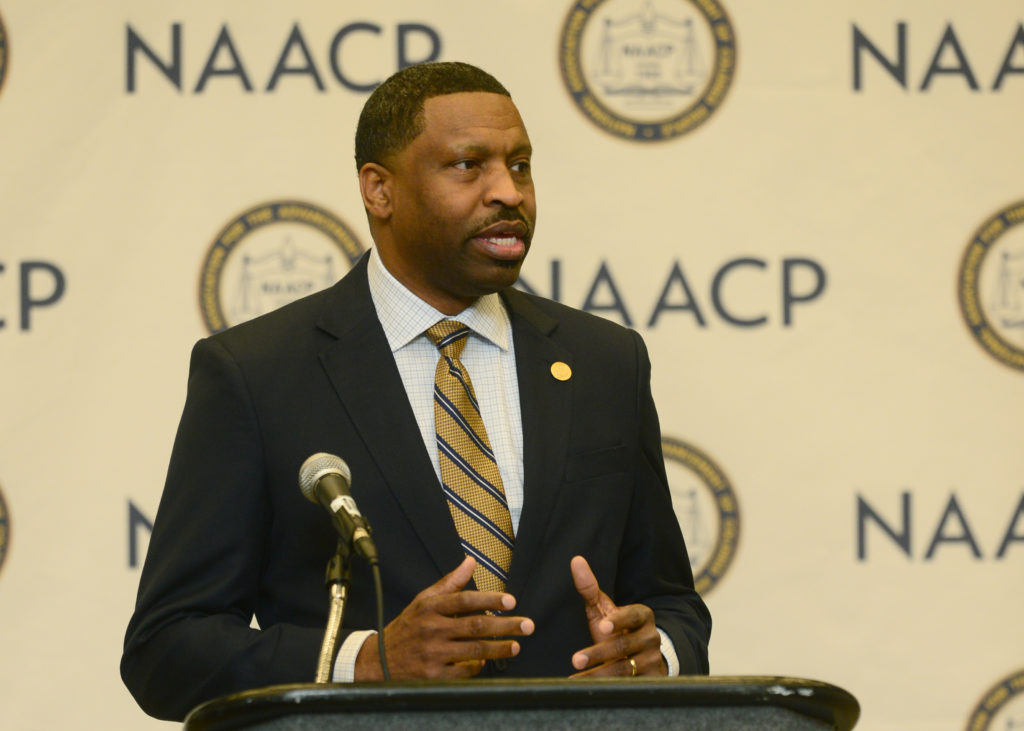The National Association for the Advancement of Colored People (NAACP) elected Derrick Johnson as its next president and CEO, with a priority of creating a national 501(c)(4) social welfare organization to oversee local affiliates. Johnson was elected vice chairman of the board of directors in February and was appointed interim president and CEO in July. He will have a three-year contract.
The 49-year-old will succeed Cornell William Brooks, who was appointed to a three-year term in 2014 but was not reappointed this spring. Ben Jealous stepped down at the end of 2013 after a five-year run as president and CEO. The NAACP president answers to the board of directors’ 17-person executive committee. The board consists of 64 members.
In a conference call with media on Saturday, Johnson said the current structure is designed so the national office can provide technical assistance, training and research to its 2,200 local units. The Baltimore, Md.-based national office is a (c)(3) but local units are (c)(4). “We’ve found that in order to be better aligned with local units, we need a national (c)(4), so that we can be stronger at convening our units, and being clear about how we can have collective impact on local and federal public policy,” Johnson said.
“We must ensure a strong national voice,” Johnson said. “For too long, we’ve operated with a set of restrictions in terms of our voice. What we will do immediately, with the support of the board, is establish ourselves as a 501(c)(4) advocacy organization, which will allow us to speak in this current political climate, in a way in which the needs and interests” of African-Americans across the country are raised and clearly displayed, he said.
Contributions to (c)(4) organizations are not deductible but organizations have more leeway when it comes to political activity. Some organizations — including American Cancer Society, American Civil Liberties Union, and Sierra Club — have a 501(c)(3) organization and a separate, affiliated 501(c)(4) organization to direct advocacy efforts.
“Our board considered the fact that our first intention was to do a nationwide search, and looking for someone who may be an outside, may be an insider, to take over the position,” said Leon Russell, board chairman of the NAACP. “However, considering after working with Derrick for a number of months, after looking at internal systems that we believe needed to be fixed, and after making a major decision to look at the organizational structure of the NAACP in terms of (c)(3), (c)(4) status, it became apparent to us that we needed to extend the period of time to take corrective action and give those corrective actions time to take effect,” he said.
The largest and oldest legacy civil rights organization in the United States, NAACP has undergone “transitions in leadership this year as it re-envisions itself to take on a tumultuous and contentious social and political climate,” according to a press release announcing the new appointment. The national organization embarked on a listening tour earlier this year after the departure of Brooks.
The 108-year-old NAACP reported more than $27 million in revenue for the year ending December 2015, the most recent tax form available, filed in November 2016. The majority of revenue was from a combination of mainly contributions and grants ($17 million) and program service revenue ($10 million, including $3 million in membership revenue). That year, Brooks earned $300,000 in base compensation. In his final year as CEO, Jealous earned base compensation of $344,144, in addition to $30,970 in nontaxable benefits. Saturday’s announcement did not include details on Johnson’s compensation.
Johnson is a native of Detroit, Mich., who now resides in Jackson, Miss. He previously served as state president of the Mississippi State Conference of the NAACP, spearheading campaigns for voting rights, workers’ rights, and equitable education. He also is the founder and executive director of One Voice, Inc., a Jackson-based nonprofit conceived after Hurricanes Katrina and Rita in 2005 to enhance the quality of life for African-Americans through civic engagement training and initiatives.
“In his time serving as our interim president and CEO, Derrick has proven himself as the strong, decisive leader we need to guide us through both our internal transition, as well as a crucial moment in our nation’s history,” said Russell. “As both a longtime member of the NAACP, and a veteran activist in his own right, Derrick also intimately understands the strengths of the association, our challenges and the many obstacles facing black Americans of all generations today,” he said.












